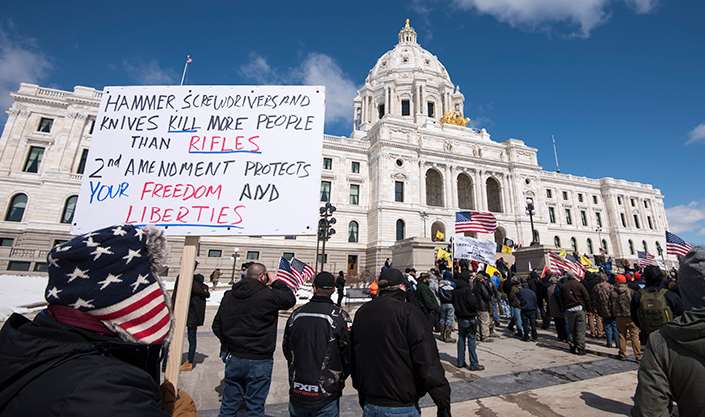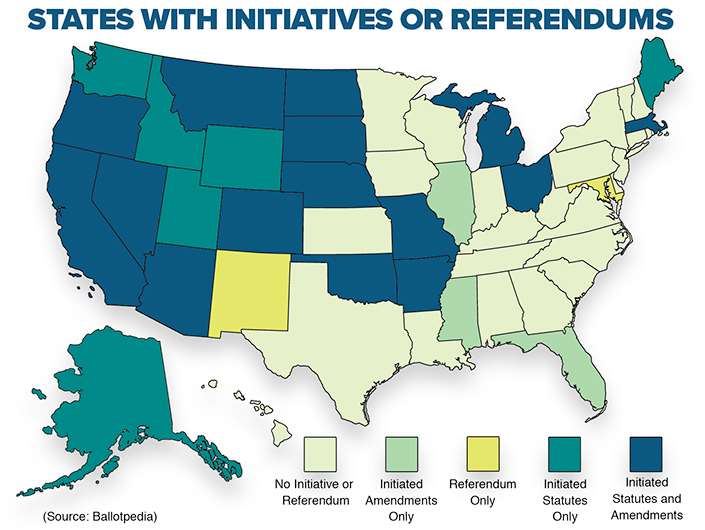
The season has passed for gathering signatures for voter initiatives in the 24 states that allow them, so firearm-prohibition outfits with fuzzy names are finished trying to get gun bans—things that couldn’t make it through the state legislatures—on state ballots this November. A few very bad ideas did make this November’s election. Not that all voter initiatives are bad, but the process can clearly be abused with both bad and ugly ideas masquerading as good common-sense reforms.
The law requires that an initiative must have an accurate, honest title and summary, as the complete text of the proposed law is usually far too long to be placed on the ballot. A misleading title and summary is the Achilles’ heel of many of these attempts, because their proponents often choose wording that is sloppy, confusing or deceptive. Proponents often write in a propagandistic style, and may try to hide from the public the true, harmful impact of an initiative. Opponents often file lawsuits alleging that the wording is misleading, and thus the signatures on petitions with such wording are invalid.
Take the case of Florida’s Ban Assault Weapons NOW, whose proposal is to make it a felony to possess “any semi-automatic rifle or shotgun capable of holding more than ten (10) rounds of ammunition....” A person who possesses one by the effective date could register and keep it, but it could never be transferred to another person, not even an heir.
The Florida Attorney General, supported by the NRA as an amicus, filed a petition with the state Supreme Court to disallow the initiative. As they argued, the summary failed to disclose that it would ban virtually all semi-automatic long guns that accept a detachable magazine, since they are “capable of holding” a magazine of over ten rounds, even if the owner possesses no such magazine. Mention of a ten-round magazine limit would confuse or deceive many voters into thinking that semi-automatic firearms with no such magazine would be lawful. The summary also did not mention that it would repeal much of the Florida Constitution’s existing right to keep and bear arms, as traditionally understood.
In its June 2020 ruling, the Florida Supreme Court threw the initiative out as misleading because the summary claimed that if one possesses an “assault weapon” before the effective date, “the person’s possession of that assault weapon” is lawful if he or she registers it. Per the Court: “The Initiative does no such thing. Contrary to the ballot summary, the Initiative’s text exempts only ‘the person’s,’ meaning the current owner’s, possession of that assault weapon.” That “misleads voters into believing that any lawfully possessed assault weapons will continue to remain lawful.”
Instead of owning up to the misleading writing, the chair of the initiative committee falsely claimed that the Florida Supreme Court is “controlled by the NRA.” As this was being written, the petition with the misleading language was still on the sponsor’s website, along with a request to donate to the organization. It does not inform the reader that the initiative will not be on the November ballot.
An ongoing initiative in Oregon is “The Common Sense Gun Regulation Act,” which should be called the “Imprison Law-Abiding Gun Owners Act.” The effort got side-railed two years ago when the Oregon Supreme Court ruled it misleading for saying it would ban “assault weapons,” which means different things to different people, when it could have more accurately stated “would criminalize the possession and transfer of many semi-automatic weapons.” The Court found several other misleading statements, as well.
The same initiative is currently being led by former Walgreens CEO Greg Wasson, who was forced out of the company after the Securities and Exchange Commission found that he misled investors, causing the company to pay a $34.5 million fine. The proposal would make it a felony to possess a semi-automatic rifle that accepts a detachable magazine if it has certain features, such as a grip that allows a non-trigger finger to be under the action when firing.
Who makes such bizarre stuff up, as what difference does it make where the fingers are placed? And don’t they realize that the fingers may be either over or under the action “when firing,” based on whether one is firing in a downward or an upward direction? What a way to trivialize the constitutional right to have arms.
Lift Every Voice Oregon—self-described “faith leaders” who seem to want to incarcerate and destroy the lives of harmless gun owners—is sponsoring three petitions to criminalize semi-automatic firearms and standard magazines. As stated by its website in April, it suspended signature gathering because of the COVID-19 virus, predicted victory in some distant future and solicited donations.
At the opposite end of the spectrum, the Constitutional Right to Own Semi-automatic Firearms Initiative proposed to amend the Oregon Constitution to classify semi-automatics, which came under special restrictions in 2018, as protected arms, and to roll back several other, unrelated restrictions, including the “red flag” law. The Secretary of State found that it complies with the procedural constitutional requirements. With 149,360 signatures required, no apparent campaign and a deadline of July 2, getting on the ballot was not to be.
The Firearm Storage and Transfer Initiative, another Oregon proposal, would ban having a firearm accessible when not carried on the person. Imagine being required to carry a firearm on your person in your own home. One could not otherwise have it accessible for self-defense, such as when showering or sleeping. In March—you guessed it—the Oregon Supreme Court ruled the summary to be misleading, as it implied that firearms had to be secured only when stored or transferred. Its chief petitioner predicts that it will not make the November ballot because the corona virus won’t allow the usual signature drives.
As this and other attempts suggest, Oregon must be the most-active state for generating ballot initiatives.
In Oklahoma, the Reinstate Permitting Requirements for Firearms Initiative got off to a bad start by drafting a misleading summary. It sought to reverse last year’s legislation to allow “permitless,” or constitutional, carry. In June, pursuant to a petition brought by the state attorney general and the Oklahoma Second Amendment Association, the state Supreme Court ruled that the summary “gives the false impression that, currently, the law does not prohibit handguns” on college campuses, and misleadingly implied that “the proposed measure would make it harder for law enforcement to confiscate firearms, but it actually makes it easier.”

As this illustrates, some sponsors babble without understanding their own initiatives. Another one bites the dust.
The Ohio Background Checks for Gun Purchases Initiative could appear on the ballot in 2021. It would criminalize the private transfer of a firearm if not processed through a federally licensed firearms dealer. Three percent of the votes cast in the preceding gubernatorial election are required to place the initiative before the Ohio General Assembly, and if it is not passed by that body, a similar three percent is necessary to put it on the ballot.
It is sponsored by Ohioans for Gun Safety. With that name, someone might think they teach excellent gun-safety classes with plenty of range time, right? Of course not.
From the other side of the debate, the Washington Carrying of Concealed Firearms Initiative would allow constitutional carry in the Evergreen State. The Washington Legal Rights for Firearm Ownership Initiative would prohibit state and local governments from confiscating firearms without due process (that’s already prohibited by the Fourteenth Amendment), and would prohibit a state or local firearm registry. Given that the only internet references to these initiatives are on Ballotpedia, which tracks all initiatives nationwide, it doesn’t look like they’re going anywhere.
Finally, good news from Montana, as the Limit Local Government Authority to Regulate Firearms Measure will be on the ballot as a legislatively referred state statute on Nov. 3. Missoula is one of the localities with restrictions, which state law currently allows. Instead of being a citizen initiative, the legislature enacted a bill to submit to the voters the issue of whether localities may restrict the carrying of permitted concealed firearms. Against a challenge by the Montana Federation of Public Employees, the state Supreme Court agreed with the attorney general that the ballot statement fairly and impartially explains the measure.
In normal times, ballot petitions often are an active aspect of the political process in states where they are available. The varieties of possible topics are unlimited. But these are not normal times, due to the corona virus. Whether the topic is firearms or any other matter of political controversy, it is probably rare that a petition this year will achieve the requisite number of signatures. But there are still lessons to be learned from this initiative season.
First, petitions that seek to infringe on Second Amendment rights frequently have topic titles and summaries that are confusing and deceptive. They use propaganda terms, take advantage of tragedies that the proposals would not have stopped, minimize the dramatic harm of the proposals on law-abiding citizens, and fail to disclose key features of the actual text of the initiative.

A good example, as discussed above, is Florida’s Ban Assault Weapons NOW proposal to ban a semi-automatic long gun “capable of holding more than ten rounds,” which deceitfully implied that such a gun that holds no more than ten rounds would be lawful. Its summary implied that a registered gun would be lawful, when in fact the person who registered it by the cut-off date would be the first and last person who could lawfully possess it. The initiative sought to take advantage of the Parkland high school murders, which occurred because of the failure of government at every level, not because of the existence of a specific type of firearm.
Often, judicial review of anti-gun initiatives has been effective in preventing initiatives with misleading titles and summaries from being put on the ballot. Attorneys general and private groups like the National Rifle Association have been instrumental in seeking relief in state supreme courts to prevent deception to the public.
The ironic aspect of the initiative process is that it was originally conceived as a mechanism by which the people may protect their rights and interests from an unresponsive legislature. As a form of direct democracy, it offers citizen participation in the enactment of laws and constitutional provisions. But the very purpose of the U.S. Bill of Rights and the state declarations of rights are to guarantee fundamental rights from violation by any quarter, including the tyranny of the majority.
(Stephen P. Halbrook, an attorney who has argued cases in the U.S. Supreme Court, is a Senior Fellow with the Independent Institute and author of The Founders’ Second Amendment, Gun Control in the Third Reich and Gun Control in Nazi-Occupied France.)


































